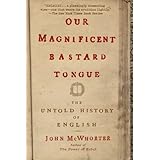
Average Reviews:

(More customer reviews)Are you looking to buy Our Magnificent Bastard Tongue: The Untold History of English? Here is the right place to find the great deals. we can offer discounts of up to 90% on Our Magnificent Bastard Tongue: The Untold History of English. Check out the link below:
>> Click Here to See Compare Prices and Get the Best Offers
Our Magnificent Bastard Tongue: The Untold History of English ReviewTo paraphrase John McWhorter: Normal people are interested in words while linguists are interested in grammar.In Our Magnificent Bastard Tongue, John McWhorter calls this everyday, normal-person view of the English language "the vanilla version" of the history of English. In this version Germanic tribes invaded England, pushed the Celts to the fringes of the British Isles, and eventually Old English (Beowulf) became Middle English (Chaucer) became Modern English (Shakespeare), with infusions of Latin and Norman French after the Conquest in 1066. In the vanilla version, English lost its case endings on its own and became the most gramatically simple Germanic language.
McWhorter, a specialist in creoles and contact languages, has another theory, which gives the Celtic languages (especially Welsh and Cornish) credit for influencing the grammar of English.
He pays as much attention to history as to linguistics, and presents evidence that large numbers of Celts were not exterminated by the small numbers of Vikings who invaded and eventually settled in the northern and eastern part of England, the Danelaw. He demonstrates that English (unlike every other Germanic language) has grammatical features in common with Celtic languages--for instance, the "meaningless do" ("Do we eat apples?") and using gerunds (like "using" in "I'm using a gerund") as a normal present tense.
In fact, hardly any other language has these features, so it's just not reasonable to assume English and Celtic developed them coincidentally.
McWhorter says we've been misled by what he calls the "post-Norman Conquest blackout of written English," the 150 years or so after the Norman invasion when French became the "scribal" language in England. The changes to Old English (with the typical features of a Germanic language like Old Norse, from which it is descended) must have been happening earlier in the vernacular language, but scribes recorded the more old-fashioned, conservative forms of written English. (I'm writing this review in a more conservative style of English than I use in speech. That's what people do when they write--they do things like use "whom" instead of "who" as a direct object, or they use a lot of parenthetical remarks.)
Over the course of more than a century after 1066, English scribes got out of the habit of writing in that conservative, "scribal" English--they wrote in French. After succeeding generations of immigrants and their descendants began speaking English instead of French, they started writing legal and other documents in their own language--English--but they felt free to transcribe an English closer to the way they actually spoke.
So what appears to be a sudden simplification of grammatical structures (losing case endings, etc.) actually happened gradually due to the influence of languages that English was in contact with, like Welsh or Cornish.
McWhorter also touches on the Sapir-Whorf hypothesis, the idea that language determines culture, or "channels thought," as McWhorter puts it. He disagrees with this hypothesis. If you want to read the opposite view, try another interesting new book--Don't Sleep, There Are Snakes: Life and Language in the Amazonian Jungle, by Daniel L. Everett.
I haven't even mentioned McWhorter's theory about the influence of Phoenician on Scandinavian and Germanic languages, and therefore English.
Our Magnificent Bastard Tongue is a relatively short book (small format, 197 pp.) but it's full of information I'd never read before about the history of English. I agree with McWhorter's last word:
Interesting.Our Magnificent Bastard Tongue: The Untold History of English OverviewA survey of the quirks and quandaries of the English language, focusing on our strange and wonderful grammar Why do we say "I am reading a catalog" instead of "I read a catalog"? Why do we say "do" at all? Is the way we speak a reflection of our cultural values? Delving into these provocative topics and more, Our Magnificent Bastard Language distills hundreds of years of fascinating lore into one lively history. Covering such turning points as the little-known Celtic and Welsh influences on English, the impact of the Viking raids and the Norman Conquest, and the Germanic invasions that started it all during the fifth century ad, John McWhorter narrates this colorful evolution with vigor. Drawing on revolutionary genetic and linguistic research as well as a cache of remarkable trivia about the origins of English words and syntax patterns, Our Magnificent Bastard Tongue ultimately demonstrates the arbitrary, maddening nature of English— and its ironic simplicity due to its role as a streamlined lingua franca during the early formation of Britain. This is the book that language aficionados worldwide have been waiting for (and no, it's not a sin to end a sentence with a preposition).--This text refers to the Hardcover edition.
Want to learn more information about Our Magnificent Bastard Tongue: The Untold History of English?
>> Click Here to See All Customer Reviews & Ratings Now
0 comments:
Post a Comment